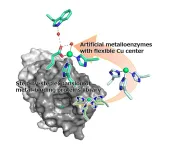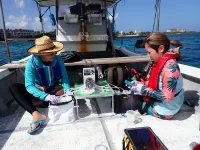Institute for Protein Innovation welcomes top researchers at first symposium
2023-03-29
(Press-News.org) BOSTON, March 29, 2023 — The Institute for Protein Innovation (IPI) will host IPI Surfacing, a symposium on cell surface receptor biology, on Thursday, June 15, 2023. The free, day-long event convenes biomedical scientists at the Joseph B. Martin Conference Center at Harvard Medical School. Registration opens today.
As its inaugural symposium, IPI Surfacing reflects the Institute’s mission to advance protein science to accelerate research and improve human health. In addition to providing biomedical researchers with protein tools and expertise to help illuminate biological processes and validate promising drug targets, the Institute also aspires to become an educational resource. This conference marks IPI’s first public effort to build and disseminate knowledge among a community of life scientists facing shared challenges.
“Embedded in our mission is the desire to promote the exchange of ideas on how protein science and technology can advance the knowledge of human health and disease,” said Ken Fasman, president and CEO of IPI. “We’re excited to bring together some of the most influential scientists in cell surface receptor biology for all to learn, connect and be inspired.”
IPI Surfacing speakers include:
Christopher Garcia, Stanford University
Yvonne Jones, University of Oxford
Debora Marks, Harvard University
Andreas Plückthun, University of Zürich
Junichi Takagi, Osaka University
In addition, Plückthun, Aled Edwards of the University of Toronto and Meghan Rego of the nonprofit plasmid repository Addgene will join a panel on the promise of synthetic antibodies and challenges to universal access.
IPI Surfacing marks a milestone in the Institute’s progress. By harnessing automation and high-throughput processes, IPI is expanding its capacity to develop and produce synthetic antibodies against cell surface receptors and secreted proteins.
“Cell surface receptors are the targets for many drugs, not to mention the gatekeepers of cell signaling,” said Rob Meijers, director of the antibody platform at IPI and a structural biologist. “Understanding the mechanisms by which a cell understands its surroundings holds enormous promise for biomedical research.”
Learn more about IPI Surfacing and register today.
-30-
About the Institute for Protein Innovation
The Institute for Protein Innovation is pioneering a new approach to scientific discovery and collaboration. As a nonprofit, we provide the biomedical research community with synthetic antibodies and deep protein expertise, empowering researchers to unlock the most elusive mysteries of biology. Our mission is to advance protein science to accelerate research and improve human health. For more information, visit proteininnovation.org or follow us on social media, @ipiproteins
END
[Attachments] See images for this press release:

ELSE PRESS RELEASES FROM THIS DATE:
2023-03-29
Scientists at the Fralin Biomedical Research Institute at VTC are looking to uncover the “why” of the American diet. Why are people drawn to ultra-processed foods, which have been linked to obesity, Type 2 diabetes, different types of cancer, and increased risk of heart disease and death?
It’s a critical question because ultra-processed foods make up about 58 percent of calories consumed in the United States. These foods have been through multiple manufacturing processes and contain many added ingredients. Examples include sweetened cereals, hot dogs, chips, and soft drinks.
“We ...
2023-03-29
INDIANAPOLIS, March 29, 2023 — Specialty coffees are gaining traction in coffeehouses around the world — and now a fermented version could bring a fruity taste to your morning cup of joe. This new kind of beverage has a raspberry-like taste and aroma, but what causes these sensations has been a mystery. Today, scientists report six compounds that contribute to the fermented coffee experience. The work could help increase production of the drink and make it more readily available for everyone to enjoy.
The researchers ...
2023-03-29
INDIANAPOLIS, March 29, 2023 — Imagine getting the benefits of gastric bypass surgery without going under the knife — a new class of compounds could do just that. In lab animals, these potential treatments reduce weight dramatically and lower blood glucose. The injectable compounds also avoid the side effects of nausea and vomiting that are common with current weight-loss and diabetes drugs. Now, scientists report that the new treatment not only reduces eating but also boosts calorie burn.
The researchers will present their results today at the spring meeting of the American Chemical Society ...
2023-03-29
Enzymes work in the cells of all living organisms, allowing specific and complex reactions to be carried out quite easily. However, few natural enzymes are effective for industrial applications, which could benefit greatly from discoveries that make targeted enzyme creation a reality.
Artificial metalloenzymes can be created simply by binding metal ions or metallic compounds to proteins, so that they exhibit enzymatic activity. Currently, metalloenzymes are being studied to discover new functions or improve their reactivity ...
2023-03-29
Lizards may be small, with only a single hearing bonelet compared to our three, and without earflaps, but their hearing is typically good. Most lizards can hear frequencies between 100 and 5,000 Hz (although they are most sensitive between 400 and 1,500 Hz), compared to between 20 and 20,000 Hz in humans. So how do lizards react to noise pollution?
Here, scientists studied the impact of noise from low-flying military aircraft on the behavior and well-being of an uncommon lizard, the Colorado checkered whiptail (Aspidoscelis neotesselatus). This ...
2023-03-29
A research group including Professors Mitsumasa Koyanagi and Akihisa Terakita of the Osaka Metropolitan University Graduate School of Science has investigated both the genetic information and structure of the photoreceptor rhodopsin, responsible for detecting dim light, of whale sharks to investigate how they can see in the dim light at extreme depths. The research group compared the whale sharks to zebra sharks, which are considered their closest relative, and brown-banded bamboo sharks, which are in the same group: the order orectolobiformes—commonly known as carpet sharks.
“This research used genetic ...
2023-03-29
In his new book Primary Health Care and Population Mortality, released next week, Professor Richard Baker draws on international evidence to show how primary health care is key to the effect of health systems on population mortality and inequality in mortality. His conclusion is that it is time to think about primary health care in a new way.
He explains: “It is as if policymakers think primary health care is little more than a triage mechanism for the health system, that its purpose is to manage access to other ...
2023-03-29
A team of astronomers has discovered one of the biggest black holes ever found, taking advantage of a phenomenon called gravitational lensing.
The team, led by Durham University, UK, used gravitational lensing - where a foreground galaxy bends the light from a more distant object and magnifies it – and supercomputer simulations on the DiRAC HPC facility, which enabled the team to closely examine how light is bent by a black hole inside a galaxy hundreds of millions of light years from Earth.
They found an ultramassive black hole, an object over 30 billion times the ...
2023-03-29
Researchers from the Okinawa Institute of Science and Technology (OIST) have developed a method to measure coral biodiversity through extracting the environmental DNA (or eDNA) from a liter of surface seawater collected from above a reef. The method has been confirmed to work through observations made by scientific divers in the same areas of ocean. The research, conducted in collaboration with the Okinawa Prefecture Environmental Science Center and University of Tokyo, was published in the Proceedings of the Royal Society B: Biological Sciences. This has paved the way for large-scale comprehensive surveys of reef-building coral to take place and removes the reliance of ...
2023-03-29
Scientists have found out how some skin cancers stop responding to treatment at the end of life.
An in-depth analysis of 14 patients who died from incurable melanoma has revealed that changes to the order, structure and number of copies of tumour DNA could cause some skin cancers to resist treatment. These changes also explain how melanoma can spread to other parts of the body.
The research, published today (29th March) in the journal Cancer Discovery, was led by scientists and clinicians at the Francis Crick Institute, UCL and The Royal Marsden. It is part of the Cancer ...
LAST 30 PRESS RELEASES:
[Press-News.org] Institute for Protein Innovation welcomes top researchers at first symposium







